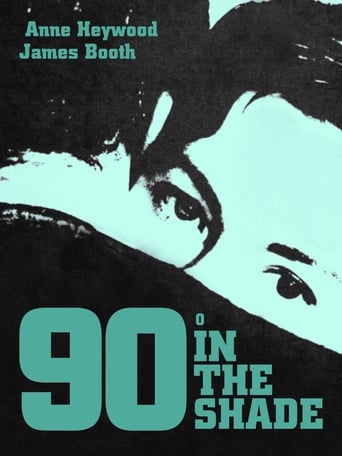Leofwine_draca
NINETY DEGREES IN THE SHADE is obscure for a reason: it's an entirely dull, lifeless, shot-in-black-and-white romantic drama made in the Czech Republic without much in the way of directorial flair or interest. The aim seems to be to make a film in the style of THE SPY WHO CAME IN FROM THE COLD but the resultant drama is instead full of uninteresting characters who do very little.About the only thing this has going for it is the interesting cast, featuring various imported actors to give it a bit of life. Donald Wolfit plays against type and is fun, for instance; it's difficult to criticise Anne Heywood's lead performance, and both James Booth and Ann Todd are reliable. A shame that the film itself is no fun at all.
Martin Bradley
A genuine oddity. This Raymond Stross produced/Jiri Weiss directed British/Czech co-production disappeared almost before it was released despite being nominated for a Golden Globe in the category of Best Foreign Film in the English Language. It was written by David Mercer, set and filmed in Prague with a British and Czech cast, all of whom were dubbed.Anne Heywood is the assistant manager of a shop who is having an affair with her married boss, (a miscast James Booth), while helping him steal from their employers. Things come to a head when an auditor, who fancies Heywood, starts snooping around. He is played by Rudolf Hrusinsky, one of the Czech actors in a cast that also includes Ann Todd and Donald Wolfit.It's superbly shot in black and white by Bedrich Batka with a terrific jazz score by Ludek Hulan. Though fundamentally 'British' it looks and feels like something from the Czech New Wave and had it been made entirely in Czech, rather than very stilted English, its critical reputation might have been much higher. As it is, it's a strange, compelling picture ripe for rediscovery.
malcolmgsw
One assumes that this was made in Czechoslovakia during the brief thaw in the communist regime under Dubcek.One further supposes that one of the main reasons for its production in Prague was economy.Obviously a wise move given the tone of the film.It has to be said that everything about this film reeks of its commercially.The atmosphere in the film is one of dread.The economy of production is self evident,and the title is truly dreadful.It would appear from this site that this film was not distributed in cinemas in the UK,and thus sat on the shelf for over 40 years till it's DVD release.This is not very surprising.The film is of interest in that it features Donald Wolcott and Ann Todd in character roles near to the end of their respective careers.Not to be watched if you are in a melancholic state of mind.
FilmFlaneur
90 Degrees is a strange, if excellent little film which sees Zulu's James Booth appear in what could easily be a work from the Czech new wave, and indeed some viewers might find the British accents of the cast (some apparently dubbed, some not) a little disconcerting in the context, although it is done well. It's a modestly scaled tale which is by turn sexual, claustrophobic, and tragic, a title pretty obscure these days but which ought never the less to be better known as it rarely takes a foot wrong. Although Booth looks a little out of place in his European environment, he turns in a characteristically chippy performance as the scoundrel womaniser Vorell, but he is almost upstaged by the dour inspector Kurka (Rudolf Hrusinsky), whose humourlessness is surely inspired by that of contemporary communist functionaries, as well as the performance of Anne Heywood as the doomed Alena.The 90 degrees of the title of course refers to more than just the sweltering heat of the year, it also invokes the sexual tensions which run throughout the film (most notably in the 'coffee wiping' stock room scene near the beginning). Vorell and Alena, as well as Kurka and his wife, are essentially two aspects of the same game; ultimately Vorell's replacement of tea-filled liquor bottles in the stockroom is a much a betrayal of empathy as is Kurka's replacement of marital warmth back at home with the coldness of duty. Down the cast list is Donald Wolfitt, no barnstorming from him here though, and one eventually wonders why he accepted such a supporting role. In some ways this is The Shop Around the Corner but a year after and with adult themes. Those familiar with Prague will also relish the backgrounds. Altogether this can be highly recommended as a forgotten bywater of British cinema. There is some fleeting nudity.


